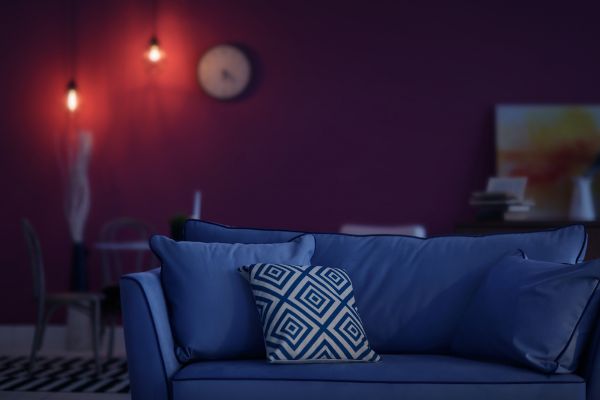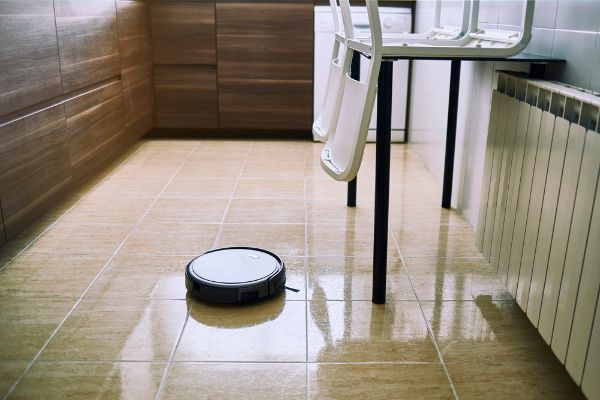Disclaimer: This post may contain affiliate links, meaning we get a small commission if you make a purchase through our links, at no cost to you. For more information, please visit our Disclaimer Page.
The Roomba is perhaps one of the most famous products for which parent company iRobot is known. It’s the name for a line of self-propelled vacuum cleaners that can suck up dust, small debris, and other things.
They run similarly to the standard vacuums you may have used yourself in the past, but you can program them to go along a set route at different times of the day. Various models may detect different levels of dirt, and some have cleaning systems that operate in different stages for deeper sanitation.
Many users program their Roombas to run throughout the day, but some people might wonder whether it is a problem to have their robotic vacuums running at night, too. We can discuss some aspects of running a Roomba during the night, with a particular focus on the noise levels they might create in the home at times when you’re more likely to be sleeping.
Additionally, we can go over some tips that you might be able to use in order to make your Roomba sound quieter at night, and we will cover topics related to Roombas and active motion detectors as well.
Table of Contents
Is It Okay To Run a Roomba at Night?
Whether it is okay to run a Roomba at night may depend on the tolerance levels of individual users. Some people are okay with a bit of noise from time to time, others may see the Roomba as something that contributes more to background noise, and still others may find that the devices are simply too noisy.
However, there might be some criteria we can use to determine how likely it is that a Roomba can run at night without being too much of a nuisance to the vacuum’s owners. In addition to some benchmarks for cleaning that we might go over, it is important to remember that different Roomba models may have their own requirements, and some may be more apt to run at night than others.
We can cover some information about the noise levels in a later section, but it is important not to forget about light levels, too. Many of the later models of Roomba robot vacuum cleaners use a small camera in order to “see” for getting around and cleaning the search areas that you will set up when you first activate your device.
Here, the Roomba will probably need at least a small amount of ambient light in the general area in order to do its job effectively. Mostly, even just something like a low-level night light plugged into a wall outlet should be able to provide enough illumination for the robot. However, the precise levels might depend on which Roomba you have, the size of the room, and how far the light spreads.
Some older Roombas may not use cameras like these in order to plot their paths. Depending on the model you have, your iRobot vacuum cleaner might be using infrared sensors or similar technologies in order to chart a course. In these cases, the vacuum should be able to perform in rooms that have a complete lack of light.
However, newer Roombas use updated tech, so they need at least some light in order to see. If you do not have a way to provide adequate lighting to run such a vacuum at night, it may get confused, bump into things repeatedly, or try to start its whole cycle over before it has finished cleaning things. Therefore, it is best to provide a bit of illumination if you have a Roomba from a later generation.
Are Roombas Too Loud To Run at Night?
Different Roomba models may produce varying levels of noise. Different models from iRobot may have different parts that contribute to this noise, too. Part of the problem may be the composition of the surfaces you are cleaning. Because carpet can muffle many sounds, your Roomba robot vacuum cleaner may be able to clean carpeted rooms in your home at night without producing noise that disturbs you.
Hardwood floors or tiles may present a bit of an issue on the noise front. In these cases, the suction, rollers, or brushes might all contribute to different noise levels when the vacuum is active.
It is possible that they could make the Roomba loud enough to disturb your peace at night, particularly if you are in the same room as the vacuum when it is going through part of its cleaning cycle.
We can go over some of the things you might be able to do to make your Roomba quieter in our next section. Before we get to that, however, we should note that you may need to wait for the vacuum to get quieter on its own.
While there are things you might do to lower the Roomba’s noise levels, it is also possible that running it through a few cycles first can do this on its own. When you do, it should wear down the brushes or rubber rollers a bit in order to make things quieter. After that, you can see if the robot vacuum is quiet enough to suit your needs at night.
How Can I Make My Roomba Quieter? 5 Tips
If you find that just waiting to add a bit of standard wear to the Roomba’s parts is not enough, there may be a few other things you can do to make the unit a bit quieter when you would like to run it at night. Our list may not be comprehensive, but it represents some of the common fixes that should be easy for individual users to try themselves.
1. Different parts on newer models should be secured before the cleaning cycle begins. The brush frame is of particular concern on any E, I, J, or S series models.
Make sure the tab for this frame is down and secure before you start cleaning. Otherwise, it can rub against surfaces and create a loud screeching sound.
2. Clean up larger clutter before activating the Roomba at night. Although it can pick up small debris, it cannot handle bigger items. If such things get caught in its rollers, it could make continuous noises as it gets stuck. Further, this could clog its system and do damage if you don’t fix it soon, something you may not be able to do if you’re asleep.
3. Some Roombas have a special Quiet Mode. On models with this feature, you can usually find a companion app for your phone. You can go into the ‘Preferences’ section here and change the mode to the quieter one.
By doing so, the Roomba should use less power to clean the home. The trade here is that it will probably take longer to finish the whole cycle.
4. If the air vent is obstructed, the Roomba can be louder than usual because of a lack of ventilation. Clean the dust filter regularly to help alleviate this issue.
5. The wheels should produce noise on hardwood or similar surfaces. However, they can be unusually loud and squeaky if they are too dirty to turn effectively. Add some lubrication to the wheels from time to time to keep them rolling right along.
Will a Roomba Set Off a Motion Detector?
A robot vacuum cleaner might set off some motion sensors, but this is not necessarily a given. It can be a concern for some homeowners who like to activate security systems at night. Many of these systems need to detect fairly large objects that offer sufficient movement or large heat signatures in order to activate.
In most cases, a Roomba vacuum should not be large enough to trip any of these sensors. However, it can very much depend on the brand that you have for your security system, as some of them seem to be a bit more sensitive than others.
How To Prevent a Roomba From Setting Off the Motion Detector
If you do find that you’re having some trouble with your iRobot Roomba setting off any kind of detection system in your home at night, you can try adjusting the height of the sensors and detectors themselves. There should be a height that is recommended by the manufacturer, but one that is too low could cause the Roomba to trip the sensors.
The other thing you can do is set the sensitivity of the system to ‘low’ if you know you’ll want the Roomba to run on a particular night. Doing so can help to ensure that the Roomba can pass through a secure room without alerting the security system.
Conclusion
Roombas are great vacuums that can save you a ton of time in cleaning the home by yourself. Although they work well when you’re out for the day, you might have good reasons for trying to run yours at night.
There should not be many problems in doing so, but some models can be quite loud on certain surfaces, especially if the robot is trying to clean where you sleep. You can follow some of our advice above to see if you can get your Roomba’s noise level to one that works for you at night.


